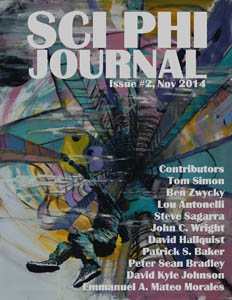The November issue of Sci Phi Journal is now available from major ebook retailers for the trivial price of $3.99 in Federal Doshes. Get yours today, just a click away!
From Amazon for your Kindle device or app
From Castalia House in EPUB and MOBI
From Smashwords in EPUB and MOBI
However, if you wish to throw rotten tomatoes at the author of ‘The Making of the Fellowship’, please don’t throw them at Amazon, Smashwords, or Castalia House; they will miss the target and only make a virtual mess. Throw them here instead.









Recent Comments